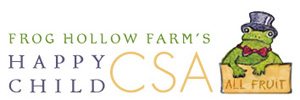There is one phrase that can strike fear in the heart of pear and apple farmers across the country – Fire Blight. This bacteria is a virulent killer. It can kill an entire orchard in a single growing season. Here at Frog Hollow, we have our own pear tree graveyard. We lost several rows of pear trees to Fire Blight last season.
The dark cloud of Fire Blight returns each year with Spring’s flowers. The bacteria responsible, enters the tree through its blossoms, making its way through the tissue of the tree. It infects and kills entire branches of the tree until reaching the roots, which typically marks the tree’s inevitable demise. The disease leaves infected limbs and trees blackened, shrunken and cracked, as though scorched by fire, giving it its name.
We’re feeling especially uneasy this week, because we’re experiencing the perfect wet, warm conditions for the disease to spread. As a preventative measure, we are spraying all of our susceptible trees with compost tea. For those unfa- miliar with the magic of compost tea, the tea is essentially a brew of myriad beneficial microorganisms which we create using the compost we create here on the farm. By spraying it on the leaves and flowers of the trees, we populate them with helpful bacteria, making it much harder for the harmful bacteria to take root.
Prevention is really the best route for this disease. Once the trees are infected, there is no other choice but to remove infected limbs of the tree. Tree surgeries like these are tedious, often unsuccessful and highly risky, especially since it could result in unintentional spreading of the disease due to bacteria on the blade used.
Just this month, the threat of Fire Blight has become even more menacing for organic farmers. For decades, the primary tool organic farmers used to control Fire Blight has been the antibiotics streptomycin and oxytetracycline. But as of just a few weeks ago, the National Organic Standards Board changed the organic standards to phase out the use of these antibiotics.Though research is being conducted, as of now, there are no known organic alternatives to fight this disease. Organic apple and pear farmers across the country are very concerned.
At Frog Hollow, we are thankful that we’ve cultivated such a strong composting practice. Our use of compost tea as a primary tool against disease, insulates us from the much of the fallout from this decision. But we are concerned for the overall impact on our fellow farmers and friends in the apple and pear industry.
None the less, we are hopeful. The organic farming industry is consistently presented with new natural and political challenges. These challenges are very much a part of the game, and it’s not one for the faint of heart. We trust that we and our friends will be able to turn lemons to lemonade yet again.

 Follow
Follow
